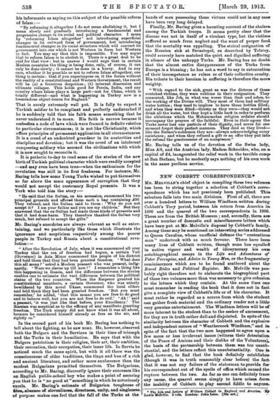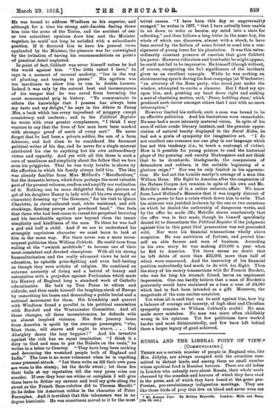NEW COBBETT CORRESPONDENCE.*
Mn. MEsvrssa's chief object in compiling these two volumes, has been to string together a selection of Cobbett's corre- spondence which has not previously been published. This selection falls into two main divisions. First of all, there are over a hundred letters to William Windham written during- Cobbett's Tory period, between his return from America ire 1800 and the quarrel of the two correspondents in 1806. These are from the British Museum ; and, secondly, there as a great number of domestic and miscellaneous letters which have been put at Mr. Melville's disposal by Cobbett's Among these may be mentioned an interesting series addressed to Queen Caroline, whose unofficial defence the "contentious' man" undertook with so much fervour. There have been many lives of Cobbett written, though none has equalled in native vigour and wealth of idiosyncrasy his own; autobiographical essays in the Life and Adventures of Peter Porcupine, and Advice to Young Men, or the fragmentary reminiscences which are to be found scattered about tine Rural Bides and Political Register. Mr. Melville was pro- bably right therefore not to elaborate the biographical part of these two volumes more than was necessary to give cohesion, to the letters which they contain. At the same time one must remember in reading the book that it does not in faet give a complete view of Cobbett's life or of his character. It must rather be regarded as a source from which the student can gather fresh material and the ordinary reader not a littler very genuine entertainment. The Windham letters will be of more interest to the student than to the seeker of amusement, for they are in truth rather dull and disjointed. In spite of the similarity between the character of Cobbett and the explosive and independent nature of "Weathercock Windham," and in spite of the fact that the two men happened to agree upon a. few more or less irrelevant issues (witness their detestation of the Peace of Amiens and their dislike of the Volunteers),. the basis of the partnership between them was too unsub- stantial, and the letters reflect this nnsubstantiality. One is. glad, however, to find that the book definitely establishes, (though it was in truth reasonably clear before) the fac1. that it was not any failure of the statesman to provide foe- his correspondent out of the spoils of office which caused the rupture between the two. As far as one can definitely trace any mime, the quarrel seems simply to have arisen twin the inability of Cobbett to play wend fiddle to anyone- • The Wm sad. Letters of William Cabot! in Engiand and Anterks. Lewis 'Melville. 2 vols. imam; John Line. [Us. net.] was bound to address Windham as hie superior, and although for a time his strong anti-Jacobin feeling threw him into the arms of the Tories, and the accident of one or two coincident opinions drew him and the Minister together, he could- not long be satisfied with a subordinate position. If it flattered him to have his general views applauded by the Minister, the pleasure was far outweighed by the irritation of having his recommendations on point of practical detail neglected.
In point of fact, Cobbett was never himself unless he had the world against him. "The little talent I have," he says in a moment of unusual modesty, "lies in the way -of plucking and tearing to pieces." His egotism was
-too inordinate to allow hits to run in double harness. Indeed it was only by the natural heat and inconsequence of his temper that he was saved from becoming the most monumental prig in history. "To communicate to others the knowledge that I possess has always been tny taste and my delight," he says in the Advice to Young Men, a book which has every ingredient of priggery except -consistency and coolness ; and in the Political Register he wrote with even greater complacence, "I think I may Wenture to say that the lives of few men halt been marked with stronger proof of merit of every sort." He never forgot that be had been a private soldier, the son of a farm Jabourer, and had risen to be considered the foremost political writer of his day, and he never for a single moment -attributed his rise to anything but his own extraordinary virtue and capacity. And yet with all this there is such a -core of manliness and simplicity about the fellow that we love Oven his priggeries. That he was truly lovable is shown by the affection in which his family always held him. The idea s`vas already familiar from Miss Mitford's "Recollections," hut the domestic letters, which form perhaps the most valuable part of the present volumes, confirm and amplify our realization of it. Nothing can be more delightful than the picture we get of his daughter Nancy (a lady with all his own strength of 'character) dressing up "the Governor," for his visit to Queen Charlotte, in claret-coloured coat, white waistcoat, and silk :stockings, dancing pumps and powdered head." One feels that those who had best cause to resent his perpetual lecturing and his ineradicable egotism saw beyond them the innate Simplicity and kindliness of the man. To them he was huff as god and half a child. And if we are to understand his strangely capricious character we must learn to look at him in the same way. For there never was a more incon- sequent politician than William Cobbett. He could turn from railing at the "swinish multitude" to become one of their most consistent and devoted champions. With all his strong bumauitarianism and the really advanced views he held on education, he upholds prize-fighting and even bull-baiting as though they were articles of religion. He combined an extreme austerity of living and a hatred of luxury and Ostentation with a prejudice against Puritanism which made his History of England long a standard work of Catholic educationists. He held up Tom Paine to odium and ridicule, and then made himself the laughing-stock of Europe by unearthing his bones and demanding a public burial and a national monument for them. His friendship and quarrel with Windham found a parallel in his political association with Burdett and the Westminster Committee. And all these changes, all these inconsistencies, he defends with an almost inspired violence. His first journey home from America is spoilt by the steerage passengers, "who, blast them, will starve and ought to starve. - . God Almighty damn the lazy beggars !" And his invective against the rich has an equal inspiration. "I think it a duty to God and man to put the Nabobs on the coals," he svrites in a letter to 'Creevey. "They have long been cooking and devouring the wretched people both of England and India." The tone is no more vehement when he is repelling some personal attack. "Let them write on till their own pens are worn to the stump; let the devils sweat ; let them fire their balls at my reputation till the- very press cries out
murder. If ever they hear me whine or complain I will give them leave to fritter my carease and trail my gutsalong the street as the French Sans-culottes did to Thomas Maudit." So he defies his American orities in the character of Peter i!orcupine. And it is evident that this vehemence was in no
degree histrionic. He was sometimes moved to it by the most pea 6d. net.]
trivial causes. "I have been this day so ungovernably enraged," he writes in 1807, " that I have actually been unable to sit down to write or becalm my mind into a state for
reflecting," and then follows a long letter in the same key, the whole of which one discovers, almost with a shock, to have been moved by the failure of some friend to send him a con- aignment of young trees for his plantation. It was this extra- ordinarily constant pressure of emotion that gave Cobbett his power. However ridiculous and bombastic he might appear, be could not, fail to be impressive. He himself (though without, of course, recognizing the fall significance of the incident) gives us an excellent example. While be was making an electioneering speech during his first campaign (at Winchester) "an attorney of the Rose party, who stood just under the window, attempted to excite a clamour. But I fixed my eye upon him, and, pointing my hand down right and making a sort of chastising motion, said, 'Peace, babbling slave,' which produced such terror amongst others that I met with no more interruption."
However limited his outlook, such a man was bound to be an effective politician. And his limitations were remarkable. No man had a more intensely material vision. In. spite of his sure if rather crude literary instinct, and the:genuine appre- ciation of natural beauty displayed in the _Rural Bides, he had not a grain of sympathy for imaginative art. "I do not recollect one romance nor one play in our language which has not this tendency (i.e., to teach a contempt of virtue). How is it possible for young princes to read the historical plays of the punning and smutty Shakespeare and not think that to be drunkards, blackguards, the companions of debauchers and robbers, is the suitable beginning of a glorious reign ? " Nor was he only limited in his apprecia- tion. He had not the humble martyr's courage of a man like William Hone: His flight to America after the suspension of the Habeas Corpus Act remains, in spite of his own and Mr. Melville's defence of it, a rather unheroic affair. We know from Lord Holland's Memoirs that it was largely distrust of his own power to face a crisis which drove him to exile. That his mistrust was justified is shown by the one or two occasions on which he denied the authorship of dangerous works, and by the offer he made (Mr. Melville shows conclusively that the offer was in fact made, though he himself specifically denied it) to discontinue the Political Register if the judgment against him in this great libel prosecution was not proceeded with. Nor were his financial transactions wholly above suspicion. He was ambitious of fortune, and proved him- self an able farmer and man of business. According to his own story he was making £10,000 a year when he fled to America. Yet there seems no doubt that he left debts of more than £32,000, more than half of which were unsecured. And the insecurity of his financial position undoubtedly had much to do with his flight. Then the story of his money transactions with Sir Francis Burdett, who was for long his staunch friend, leaves an unpleasant impression. One can hardly believe that a man of Burdett's generosity would have reclaimed as a loan a sum of E4,000 which had in fact been intended as a gift. Moreover, the magnitude of the sum excites suspicion.
Yet when all is said that can be said against him, how big a balance of courage and honesty, of high ideal and Christian sympathy remains to William Cobbett's credit! No man made more mistakes. No man was more often childishly wrong in his opinions. Yet few politicians have worked harder and more disinterestedly, and few have left behind them a larger legacy of good achieved.











































 Previous page
Previous page